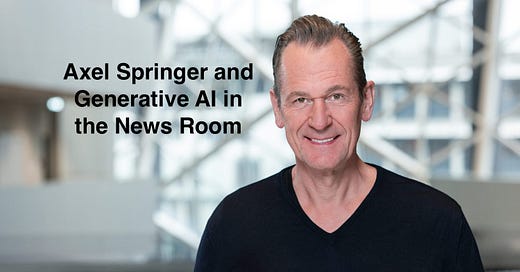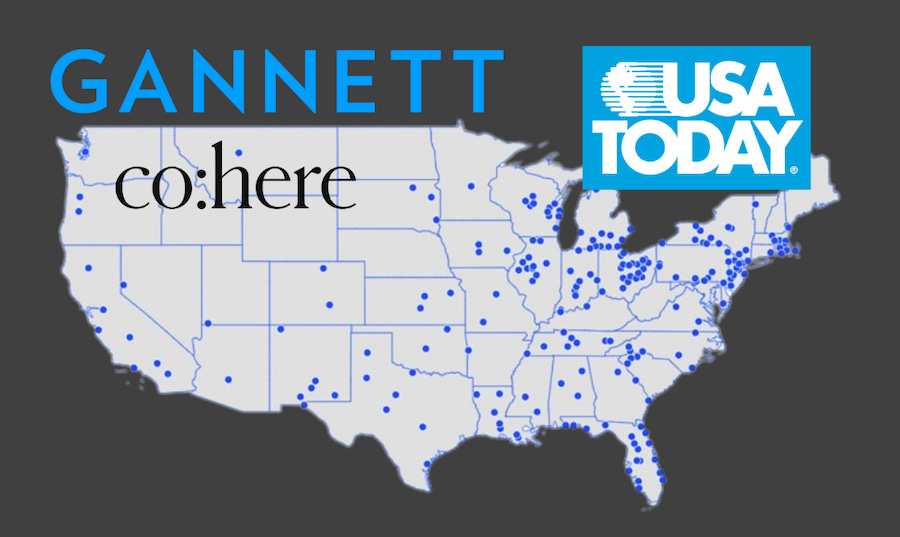German News Publisher CEO Confirms AI Will Cannibalize Newsroom Jobs
However, he suggests it will not impact front-line journalists
News broke ten days ago that Germany’s largest news publisher, Bild, would be laying off an estimated 200 staff as part of a cost-cutting plan. The Guardian and Frankfurter Allgemeine both reported that several staff functions would be replaced by AI. According to the Guardian:
Bild’s publisher, Axel Springer SE, said in an email to staff seen by the rival Frankfurter Allgemeine (FAZ) newspaper that it would “unfortunately be parting ways with colleagues who have tasks that in the digital world are performed by AI and/or automated processes”. The short-term job-losses, expected to be in the region of 200, are due to a reorganisation of Bild’s regional newspaper business and are not believed to related to AI.
Frankfurter Allgemeine reported the original story based on the review of the internal Springer email:
"The functions of editor-in-chief, editors, proofreaders, secretaries and photo editors will no longer exist as they do today." Of course, according to Springer, that is not the use of AI, but rather due to changes in work processes that are independent of it.
Bild Denies the Link to AI
However, a Bild spokesman denied the linkage between AI and the job cuts to Cointelegraph:
Christian Senft, told Cointelegraph that the “reports are false” and that “with our current measures, we have no intention of replacing journalism with AI."
Instead, Senft said the announcement was regarding a restructuring program for regional newspaper editions, which involves reducing from 18 regional editions to 12 by the end of the year, and the closing of 10 out of 15 regional offices, with many functions moving centrally to Berlin.
…
“Therefore, these tasks such as secretariats and photo production are no longer necessary in the regions,” he said, reiterating that the associated job reductions have nothing to do with AI.
However, the Bild spokesman confirmed that the company was “exploring areas of application for AI.” You can be the judge about whether the original email that said these jobs are now “performed by AI” should be read as the cause or means for replacement or whether it is simply a consolidation of functions.
Of course, you can centralize and gain efficiencies around certain functions because automation can make individuals more productive. That may be harder to accomplish when staff is spread out among multiple regional offices.
Axel Springer CEO Confirms the AI Thesis
The story evolved this week with comments by Axel Springer CEO Mathias Döpfner during an interview at Cannes Lion Festival. Yahoo Finance reported Döpfner’s comments:
Those outdated production structures and workflows should be changed proactively. And that means concretely, in the case of Bild, what we announced yesterday, we have 18 different regional offices, big physical offices, with PAs, with office heads, with production managers, with the central layout, the central production editors, and so on. And we just think that is the wrong allocation of capital and of people. We don’t need offices in the physical sense—we have remote work. What we need is reporters on the street. We don’t need decentral layouters that can be done with the help of A.I. very efficiently and more centrally, but what we need is more investigative reporters, more experts who are reporting on certain topics, more great writers.
…
I think the whole idea that we aggregate information that is out there because wire services have provided it, or other media have reported on it, and that then an editor sits down and rewrites it, is a totally outdated model. Nobody will ever do it. You do it in a second with generative A.I. When large language models can simply do it better, why would I need a person for that? But the person who’s really writing the super interesting, fascinating, charismatic, contrary editorial, or the person who is coming up with a great report on Cannes Lions at the beach, that will be always needed.
Like Bild, Gannett, the largest U.S. news publisher is also in the news for its plans to use generative AI in the newsroom. The initial focus is expected to be news summaries as with Bild. Gannett implemented several layoffs in 2022 and is currently in the midst of a contracted labor negotiations with its staff journalists.
CNET, Buzzfeed, Sports Illustrated, and Men’s Journal have all experience some bad publicity about their use of generative AI for low quality and factually incorrect articles. What this tells us is that generative AI is a trend in the news media and it is unlikely to abate in reaction to some negative news coverage. The productivity gains created by generative AI will only be realized when job cuts follow or new jobs never materialize.
AI is Going to Affect White Collar Jobs
The fact is that generative AI is going to impact white-collar jobs. We have been through decades of automation that have displaced blue-collar workers. Generative AI is bringing that to services and knowledge domains.
It may be true that generative AI will create jobs. It is also true that it will make some jobs unnecessary. The closer the news job is to content creation, the safer it is for the moment. News publishers still need journalists. They also need editors and copywriters. However, the advent of generative AI means they need fewer now than in the past. Then again, they may need more fact-checkers.
USA TODAY Publisher Gannett Taps Cohere for Generative AI Driven News Summaries
Gannett is the largest U.S. news publisher, with over 200 daily publications. The company has faced a series of strikes by unionized journalists this month spurred by delays in contract negotiations. It also plans to implement generative AI for automating news summaries and other writing tasks.
Inflection AI Raises $1.3 Billion in New Funding Round
Inflection AI announced it has raised $1.3 billion in a new funding round led by Microsoft, NVIDIA, Reid Hoffman, Bill Gates, and Eric Schmidt. This represents another big bet by Microsoft, which invested over $13 billion in OpenAI and today is believed to have effective control of the leading generative AI foundation model creator.







